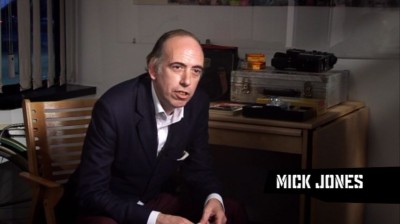| Reviews & Columns |
|
Reviews DVD TV on DVD Blu-ray 4K UHD International DVDs In Theaters Reviews by Studio Video Games Features Collector Series DVDs Easter Egg Database Interviews DVD Talk Radio Feature Articles Columns Anime Talk DVD Savant Horror DVDs The M.O.D. Squad Art House HD Talk Silent DVD
|
DVD Talk Forum |
|
|
| Resources |
|
DVD Price Search Customer Service #'s RCE Info Links |
|
Columns
|
|
|
Rise and Fall Of The Clash, The
Shout Factory // Unrated // April 29, 2014
List Price: $14.98 [Buy now and save at Amazon]
Your mother does the washing up
Your old man digs the garden
You're only free to dodge the cops
An' bunk the train to stardom
- The Prisoner (Strummer, Jones)
You'll get little argument from music fans that The Clash belongs in the top tier of rock bands. Their 1976 self-titled debut album was a tour-de-force and 1979's masterpiece, London Calling (the album that turned me on to the band when I discovered it in 1980), was listed 8th on Rolling Stones' list of the greatest rock albums of all time. Yet at the height of their popularity the fired their drummer, Topper Headon, and then a year later Mick Jones was sacked. This led to a rapid and steady decline, right when the band was at the peak of their popularity. The whole story of the group's disintegration is chronicled in The Rise and Fall of the Clash, and while there is almost nothing on the bands formation or rise to fame, this documentary does a very good job at getting behind the scenes and relating just what happened to cause 'the only band that matters' to break up.
This documentary starts with a very brief overview of the members of the band and then focuses on their manager, Bernard Rhodes, who isn't interviewed and ends up taking a lot of the blame for the disintegration of the group. It then jumps to a point when the group is reaching superstardom. The Clash opened for The Who on one leg of the latter group's supposedly last tour, playing to filled stadium crowds. They had a successful US tour to promote their most commercially successful album, Combat Rock, which was on the Billboard charts for over a year. They picked up a half million dollar paycheck for giving a single show at 1982's US Festival, and then... that was pretty much it.


The Clash was one of those groups where the total was much more than just the sum of the parts. Joe Strummer wrote most of the songs and belted out the lyrics, sometimes assisted in both by guitarist Mick Jones. The two were a great, if turbulent team and like Lennon and McCartney they were able to rein in each other's excesses. Their bass player, Paul Simonon (who isn't mentioned as much as he should be in the docu) gave the band's sound a good punch, but the drummer, 'Topper' Headon was really amazing. Good drummers often add a lot of energy to a band, but Topper really took the excitement of The Clash's music up a notch.
That's why it was such a blow to the band when Topper became addicted to heroin. In a controversial move they fired him when his addiction started to affect his playing and the band. During this time Mick Jones and Joe Strummer were clashing, and it got so bad that they wouldn't travel on the same tour bus with each other. The manager, Rhodes, was firmly in Strummer's camp (or was it that Strummer was in Rhodes?) and they conspired to fire Jones soon after the US Festival concert. They tried to fill the irreplaceable Mick Jones with not one but two guitarists (who were put on a salary of 150 British Pounds a month rather than a cut of the profits) and a final album was released, but after Jones departure following Topper's sacking it just wasn't The Clash anymore.
Filled with recent interviews with people who were associated with the band at the time (including the replacement guitarist and drummers) as well as their friends and most notably Mick Jones himself (as well as loads of vintage footage of the band), the film does a good job of describing the tension behind the scenes and the chronicling the band's disintegration. It would have been nice if the other major members of the band, Topper and Paul Simonon (Joe Strummer is no longer with us) had agreed to being interviewed but it's not unusual that they wouldn't want to relive a rather turbulent time in their lives. The other big omission is Bernard Rhodes who comes across as the villain in this drama and having his side of things would have made the movie seems a bit more balanced.


I also wish this film had, as its title implies, covered the entire career of the band. The origin and rise of the band isn't covered at all, and their greatest album, London Calling, is only mentioned once in the whole movie. You pretty much have to know just who and what The Clash is going into the film. (One example: They mention a couple of times that the band was political but they never explain their politics aside from stating that they wanted a cut of the US Festival to go to charity. Mentioning and playing songs like Career Opportunities and London's Burning would have good, but explaining how they agreed to take a large cut in royalties to keep the price of their triple album, Sandanista, down would have been better.)
Having said that, this film is an excellent look at the fall of a great band. Torn apart by hubris and clashing egos, the group's convoluted story is laid out in an understandable fashion. That's saying a lot too. I was a very big fan of The Clash when this was happening, and reading the music press at the time it was nearly impossible to figure out what was really going on. At one point it was claimed at the time that Mick Jones was forming a band that he was also going to call The Clash, to compete with Joe Strummer's version of the group. (In this film Jones says that he did tell publicists and reporters that he was going to do that, but only as a means of jabbing at Strummer. He says he was never serious.) Having the inside scoop of just what was going on told by people who were there is a valuable thing, and this documentary does that very well.
Audio:
The stereo audio is very good. Being a documentary there aren't a lot of audio effects, but the voices are clear and the music is clean and crisp. There are optional subtitles available in English, German, and French.
Video:
The 1.78:1 image is also very good. The picture on the new interviews is very sharp and crisp and looks excellent. There is a lot of vintage footage of the band, from rare bootleg video of very early shows to the US Festival shots, and that varies a bit. The professionally shot bits look fine, but the sections from a VHS camcorder that someone snuck into a concert are naturally fuzzy and indistinct.
Extras:
Unfortunately there are not any extras. I was really disappointed in that. I was hoping for some rare vintage songs or interviews being included, but would have settled for outtakes from the discussions that were recorded for the movie. There isn't anything extra though.
Final Thoughts:
While this film does not, as the title implies, chronicle the creation of the band or even their rise to stardom, it does aptly examine the hubris that lead to their breakup. It is a very nice document for fans of the group who are looking to delve into what went on behind the scenes. Recommended.
Your old man digs the garden
You're only free to dodge the cops
An' bunk the train to stardom
- The Prisoner (Strummer, Jones)
You'll get little argument from music fans that The Clash belongs in the top tier of rock bands. Their 1976 self-titled debut album was a tour-de-force and 1979's masterpiece, London Calling (the album that turned me on to the band when I discovered it in 1980), was listed 8th on Rolling Stones' list of the greatest rock albums of all time. Yet at the height of their popularity the fired their drummer, Topper Headon, and then a year later Mick Jones was sacked. This led to a rapid and steady decline, right when the band was at the peak of their popularity. The whole story of the group's disintegration is chronicled in The Rise and Fall of the Clash, and while there is almost nothing on the bands formation or rise to fame, this documentary does a very good job at getting behind the scenes and relating just what happened to cause 'the only band that matters' to break up.
This documentary starts with a very brief overview of the members of the band and then focuses on their manager, Bernard Rhodes, who isn't interviewed and ends up taking a lot of the blame for the disintegration of the group. It then jumps to a point when the group is reaching superstardom. The Clash opened for The Who on one leg of the latter group's supposedly last tour, playing to filled stadium crowds. They had a successful US tour to promote their most commercially successful album, Combat Rock, which was on the Billboard charts for over a year. They picked up a half million dollar paycheck for giving a single show at 1982's US Festival, and then... that was pretty much it.


The Clash was one of those groups where the total was much more than just the sum of the parts. Joe Strummer wrote most of the songs and belted out the lyrics, sometimes assisted in both by guitarist Mick Jones. The two were a great, if turbulent team and like Lennon and McCartney they were able to rein in each other's excesses. Their bass player, Paul Simonon (who isn't mentioned as much as he should be in the docu) gave the band's sound a good punch, but the drummer, 'Topper' Headon was really amazing. Good drummers often add a lot of energy to a band, but Topper really took the excitement of The Clash's music up a notch.
That's why it was such a blow to the band when Topper became addicted to heroin. In a controversial move they fired him when his addiction started to affect his playing and the band. During this time Mick Jones and Joe Strummer were clashing, and it got so bad that they wouldn't travel on the same tour bus with each other. The manager, Rhodes, was firmly in Strummer's camp (or was it that Strummer was in Rhodes?) and they conspired to fire Jones soon after the US Festival concert. They tried to fill the irreplaceable Mick Jones with not one but two guitarists (who were put on a salary of 150 British Pounds a month rather than a cut of the profits) and a final album was released, but after Jones departure following Topper's sacking it just wasn't The Clash anymore.
Filled with recent interviews with people who were associated with the band at the time (including the replacement guitarist and drummers) as well as their friends and most notably Mick Jones himself (as well as loads of vintage footage of the band), the film does a good job of describing the tension behind the scenes and the chronicling the band's disintegration. It would have been nice if the other major members of the band, Topper and Paul Simonon (Joe Strummer is no longer with us) had agreed to being interviewed but it's not unusual that they wouldn't want to relive a rather turbulent time in their lives. The other big omission is Bernard Rhodes who comes across as the villain in this drama and having his side of things would have made the movie seems a bit more balanced.


I also wish this film had, as its title implies, covered the entire career of the band. The origin and rise of the band isn't covered at all, and their greatest album, London Calling, is only mentioned once in the whole movie. You pretty much have to know just who and what The Clash is going into the film. (One example: They mention a couple of times that the band was political but they never explain their politics aside from stating that they wanted a cut of the US Festival to go to charity. Mentioning and playing songs like Career Opportunities and London's Burning would have good, but explaining how they agreed to take a large cut in royalties to keep the price of their triple album, Sandanista, down would have been better.)
Having said that, this film is an excellent look at the fall of a great band. Torn apart by hubris and clashing egos, the group's convoluted story is laid out in an understandable fashion. That's saying a lot too. I was a very big fan of The Clash when this was happening, and reading the music press at the time it was nearly impossible to figure out what was really going on. At one point it was claimed at the time that Mick Jones was forming a band that he was also going to call The Clash, to compete with Joe Strummer's version of the group. (In this film Jones says that he did tell publicists and reporters that he was going to do that, but only as a means of jabbing at Strummer. He says he was never serious.) Having the inside scoop of just what was going on told by people who were there is a valuable thing, and this documentary does that very well.
The DVD:
Audio:
The stereo audio is very good. Being a documentary there aren't a lot of audio effects, but the voices are clear and the music is clean and crisp. There are optional subtitles available in English, German, and French.
Video:
The 1.78:1 image is also very good. The picture on the new interviews is very sharp and crisp and looks excellent. There is a lot of vintage footage of the band, from rare bootleg video of very early shows to the US Festival shots, and that varies a bit. The professionally shot bits look fine, but the sections from a VHS camcorder that someone snuck into a concert are naturally fuzzy and indistinct.
Extras:
Unfortunately there are not any extras. I was really disappointed in that. I was hoping for some rare vintage songs or interviews being included, but would have settled for outtakes from the discussions that were recorded for the movie. There isn't anything extra though.
Final Thoughts:
While this film does not, as the title implies, chronicle the creation of the band or even their rise to stardom, it does aptly examine the hubris that lead to their breakup. It is a very nice document for fans of the group who are looking to delve into what went on behind the scenes. Recommended.
|
| Popular Reviews |
| Sponsored Links |
|
|
| Sponsored Links |
|
|
| Release List | Reviews | Shop | Newsletter | Forum | DVD Giveaways | Blu-Ray | Advertise |
|
Copyright 2024 DVDTalk.com All Rights Reserved. Legal Info, Privacy Policy, Terms of Use,
Manage Preferences,
Your Privacy Choices | |||||||














